
Tisha b’Av 5783 B”H
Table of Contents
Today marks a traditional Jewish commemorative day of fasting known as “Tisha b’Av.”
Because it is “customary,” the question becomes:
Is Tisha b’Av “Biblical?”
Let’s get straight to the Scriptures to find out.
No matter what you are studying, always ask this question: is it Biblical?
Does this line up with God’s Word?

This will prevent you from falling into errors.
Tisha b’Av is not one of the moedim, meaning it is not one of the “appointed times” or Biblical feasts, but the Scriptures definitely make reference to the fasting of Tisha b’Av that became and remains a part of the life and culture of Israel during the month of Av.
Hebrew Civil Calendar
“Av” is one of the months of the Hebrew calendar. The Hebrew months do not line up perfectly with our months, but this list can give you a sense of how the civil calendar works:
Shevat (January-February)
Adar (February-March)
Nisan (March-April)
Iyyar (April-May)
Sivan (May-June)
Tammuz (June-July)
Av (July-August)
Elul (August-September)
Tishrei (September-October)
Cheshvan (October-November)
Kislev (November-December)
Tevet (December-January)
Notice, Av is in the summertime. It was in July or August when both Temples in Jerusalem were destroyed.
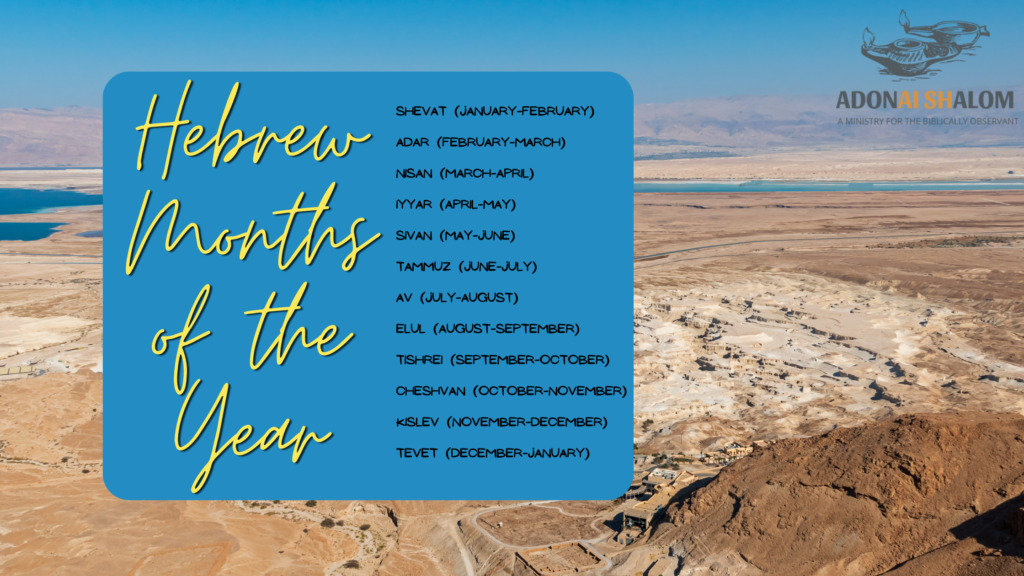
Hebrew Religious Calendar
On the civil calendar, Av would be considered the 7th month, but the religious year is calculated differently.
The Hebrew “Biblical” or “Religious” Calendar begins with Nisan making Av the 5th month of the Biblical or “Religious” year.
This is very helpful to understand because when you read various Scriptures about the month of Av, it can be confusing if you don’t know the order of the months according to the Biblical calendar.
In this verse from Zechariah 7, for example, it would make sense for the fifth or seventh to refer to Av considering the reference to mourning; however, using the Biblical calendar here the Bible references both the fasting day of Tisha b’Av as well as the seventh month during which occurs the Day of Atonement (and day of fasting) known as Yom Kippur:
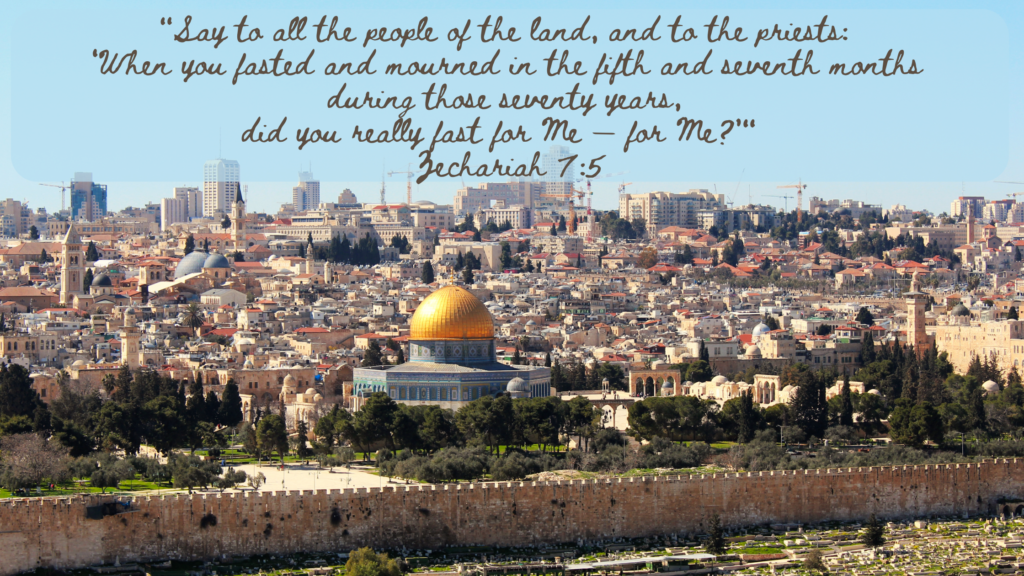
What is Tisha b’Av?
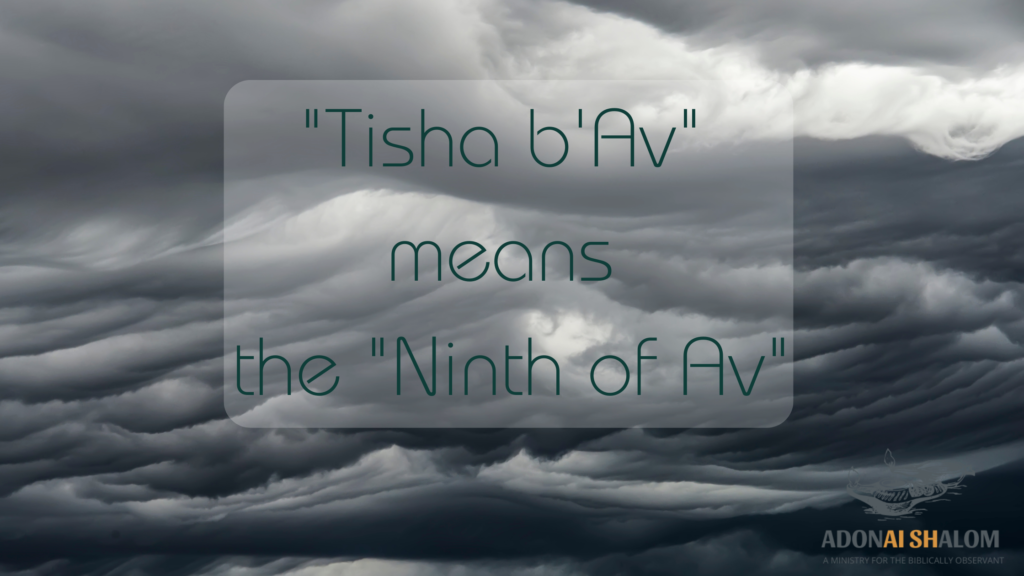
“Tisha b’Av” means the “Ninth of Av.”
You’ve heard to beware of the Ides of March?
In Jewish history, beware of Tisha b’Av.
Some have likened Tisha b’Av to the events of September 11, 2001. Tisha b’Av is like a Jewish 9/11. Yet somehow worse than 9/11; it is as if 9/11 happened nearly every year. Tisha B’Av is a day that has, on multiple occasions, historically been a day of terror.
What has happened on Tisha b’Av?
As I mentioned briefly above, during the month of Av, both Temples in Jerusalem were destroyed, the Jews were exiled, and later in history, many other terrible events including the First Crusade also occurred on the 9th of Av.
2 Kings 25:8-12 records:
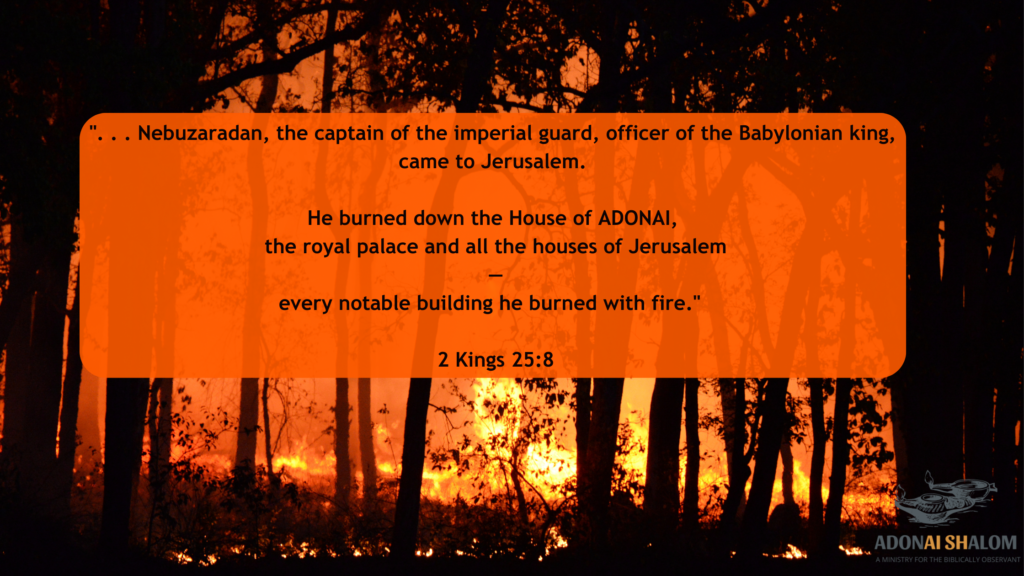
According to 2 Kings 25:8, Nebuzaradan came to Jerusalem just two days before Tisha b’Av and set fire to Jerusalem. There would have been desperate mourning taking place on Tisha b’Av that year. Jeremiah 52:15 places these events as occurring on the 10th of the month, just one day after Tisha b’Av, confirming that on or around Tisha b’Av many calamities have befallen the Jewish people.
Rabbi Mordechai Beher of Ohr Somayach has compiled a list of the History of Events that have occurred on Tisha b’Av that I found very interesting and you may well want to check out.
Tisha B’Av is a National Day of Mourning in Israel.
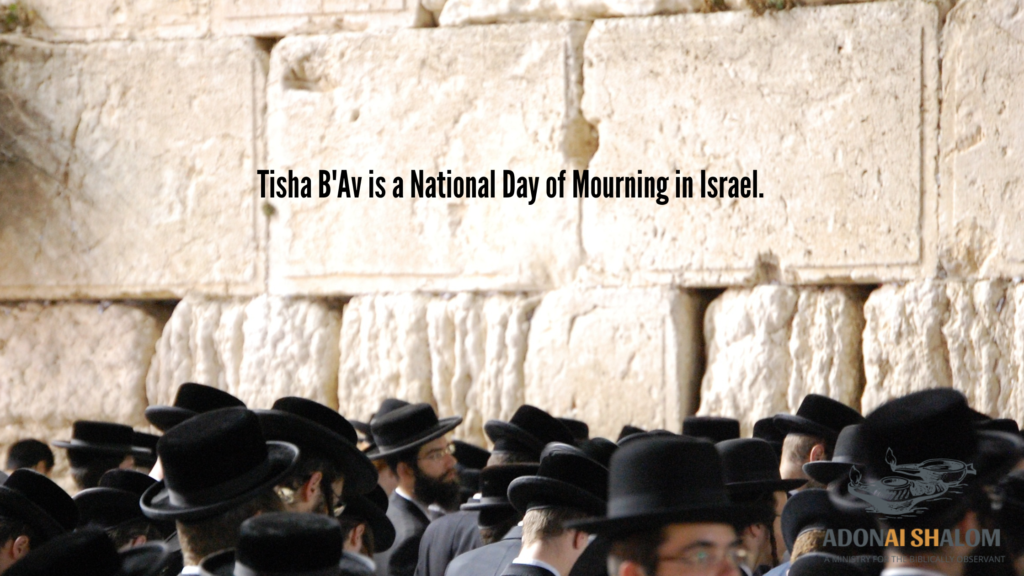
Thousands of faithful Jews pilgrimage to the Western Wall or “Kotel” in Jerusalem in order to pray for the nation on Tisha B’Av.
Being able to physically pray in that place is quite miraculous because this would have been impossible prior to 1967 when Israel was able to regain hold of East Jerusalem.
The Western Wall (or “Wailing Wall”) is all that remains of the 2nd Temple.
The Second Temple was constructed after the Jews returned from the Babylonian Exile, but it was destroyed by the Romans in 70AD; much like the First Temple (build by Solomon) was destroyed by the Babylonians in 586BC.
The Temple was an enormous part of Jewish religious and cultural life.
For this reason, Messiah Yeshua (Jesus Christ) came when He did: He predicted the coming fall of the Temple and also prepared those who would believe for the Resurrection:
“‘So the Jews answered and said to Him, “What sign do You show to us, since You do these things?’
Jesus answered and said to them, ‘Destroy this temple, and in three days I will raise it up.’
But He was speaking of the temple of His body.
Therefore, when He had risen from the dead, His disciples remembered that He had said this to them; and they believed the Scripture and the word which Jesus had said.” John 2:18-21
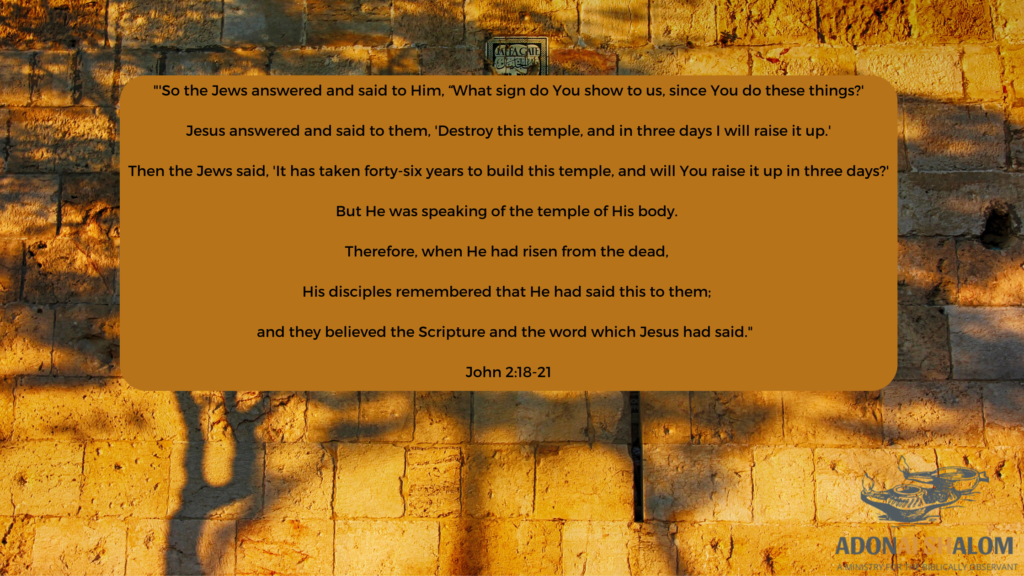
Those who do not yet know Jesus as Messiah continue to mourn the loss of the Temple and we must pray for them to come to a fuller understanding of all that the Bible reveals about this subject. Faithful Jews pray three times every day for the Third Temple to be built, and that it would come speedily.
This reminds me of the Aramaic phrase used by Christians all around the word: Maranatha. מרנאתא Come, Messiah Yeshua, Come quickly please! (1 Corinthians 16:22; Revelation 22:20)
The rebuilding of the 3rd Temple is actually very important to Biblical prophecy, and we see the fulfillment happening in our time. This is an exciting time to be a follower of Jesus! Soon He will return for us!
Preparations are being made for the Third Temple, but there is a significant problem.
The land where the Third Temple is to be rebuilt has been claimed by the Islamists. The Al-Aqsa Mosque is built on the very site where the First and Second Temples so prominently stood. This is why there is so much lament and mourning as well as conflict surrounding the Temple Mount in Jerusalem.
Fasting and Mourning shall become Joy, Gladness, and Feasting
If you have a heart for Israel, Tisha b’Av is a perfect opportunity to pray in solidarity with God’s people for the salvation of national Israel.
Look at this amazing promise from Zechariah 8:19. The days of fasting will one day end and there will be joy, gladness, and cheerful feasts!
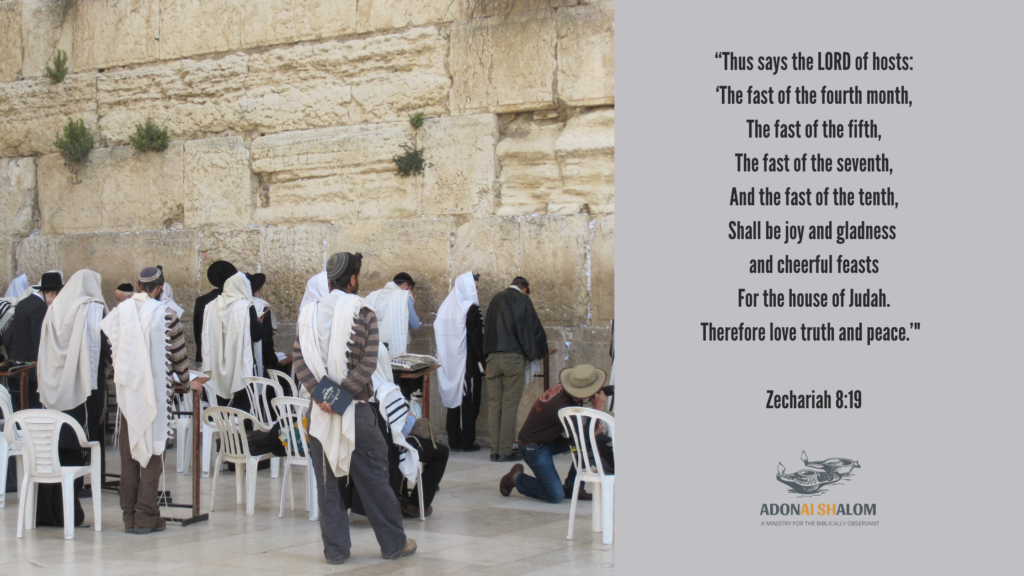
There is reason to rejoice because despite all of the trials of life, one day there will be restoration and peace.
Av and Abba
Av is a name for Father in Hebrew related to the term many of us know for God which is “Abba.”
Surely it is no coincidence that Tisha b’Av is a day to turn to our Abba Father!
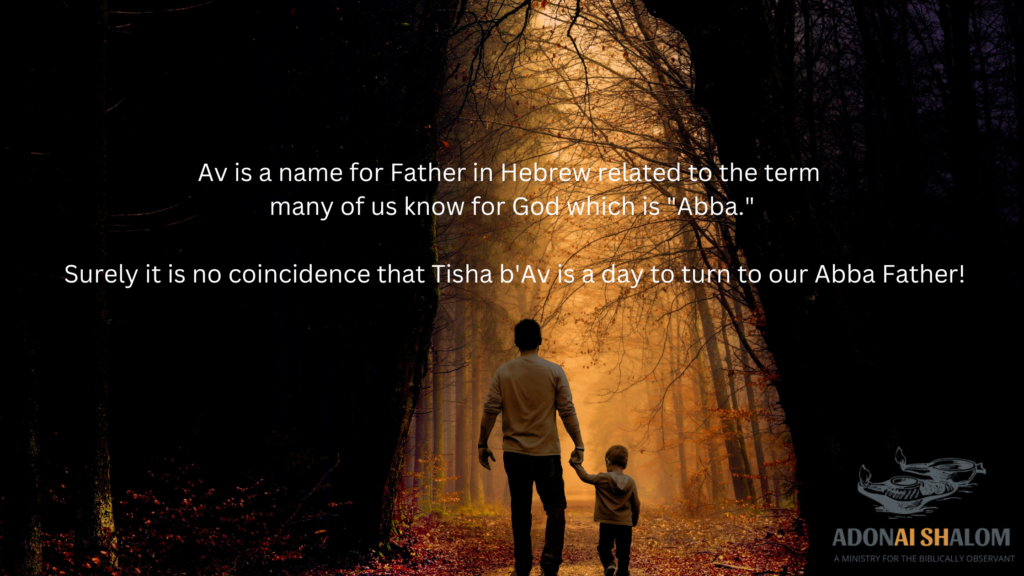
Whenever we feel trouble brewing, whenever we feel threatened, surrounded, uneasy, stressed out, fearful, or even attacked;
Whenever all we have known suddenly gets ripped out from under our feet;
Whenever we feel lost, shaken, and so overwhelmed that we don’t know if we can continue on,
we MUST turn to our Abba Father!
In this world, we will face trouble and calamity, but our Savior and Messiah has overcome the world:

Our body the Temple
The Temple made with human hands was destroyed. More than once! But this actually is not reason to lament, even though it certainly is sad. Jesus the Messiah revealed that God does not dwell in manmade temples.
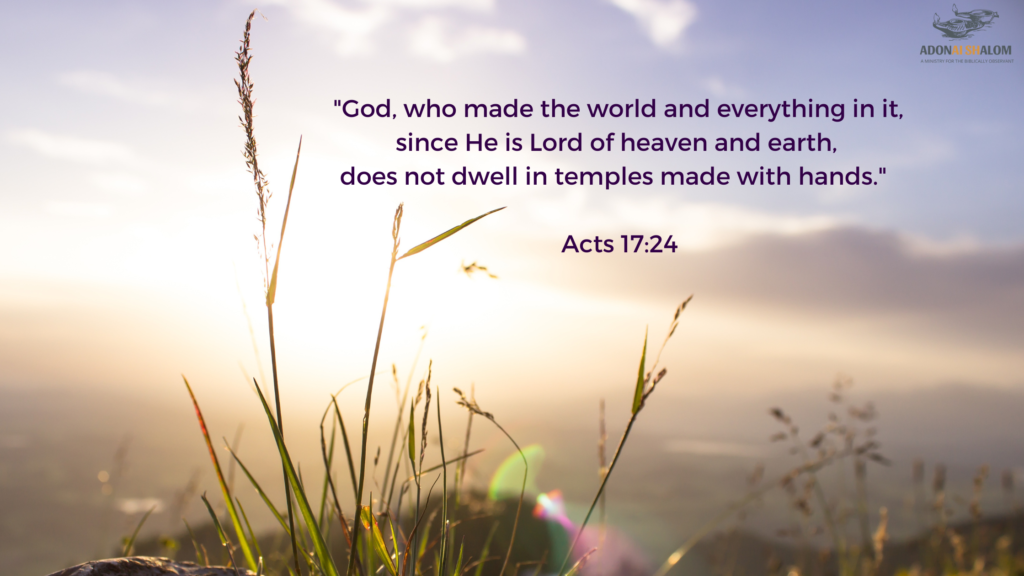
Our Redeemer paid the price for us and now He dwells within us! We are the Temple of the Holy Spirit, a temple not made with human hands:

As such, we are to glorify God with our bodies “as instruments of righteousness to holiness.” (Matthew Henry Commentary on the Whole Bible, 1 Cor.6).
Let us turn to our Abba Father, beseeching the Holy Spirit who dwells within us to make us continually holy so that we may be prepared for the Day of our Messiah’s return!







Wow- this is fascinating. Thank you for explaining all that and putting the pieces together. God’s Word never ceases to amaze and I love learning more and more about our Jewish roots. Thank you Sister!
Great teaching, as always, friend! I’m soaking this in today! Thank you!!!!
Wow this is amazing Jennifer! I need to return to this again as I was struggling to hold on to what was what and when in this one sitting. Thank you for digging deep on this and sharing the incredible wealth of this knowledge with us. LOVE all your teachings, love the insight and wisdom! Soaking it all in … 🙏🥰💕
Jennifer, I love your study on Tisha b’Av. Beautiful words and the history that is our future.